Master the Caliper Assessment in 2025 with Caliper QuickPass™
- Overview
- Sample Questions
- Curriculum
- Reviews
The Caliper Assessment (also known as Talogy Caliper™, Caliper Profile or Caliper Test) is far more than just another pre-employment test—it’s a deep dive into how you think, work, lead, and adapt. Used by Fortune 500 giants like Amazon, Geico, and Wellstar, this assessment is the silent gatekeeper for today’s most competitive roles.
But here’s the catch: more than 83% of candidates are filtered out every single year. That means only the top 17% demonstrate the mental agility and personality alignment employers are truly seeking.
With no time limits, advanced visual questions, and a complex personality scoring model, the Caliper test challenges even the sharpest candidates. It’s not just about what you know—it’s about how you think under pressure, how you make decisions, and how well you align with the company’s DNA.
That’s why we created Caliper QuickPass™–a comprehensive prep course built to mirror the real exam. With realistic simulations, visual drills, and personality alignment strategies, Caliper QuickPass doesn’t just prepare you–it transforms you into the kind of candidate top companies are actively seeking.
Ready to see how it all works? Keep reading to explore what’s on the test, and how Caliper QuickPass™ gives you the edge.
What is a Caliper Assessment?
The Caliper Assessment, administered by Talogy (formerly PSI Caliper), is a psychometric tool used by top employers to evaluate whether a candidate is the right fit for a specific role. Instead of a simple pass/fail score, this test builds a comprehensive profile of personality, cognitive strengths, and behavioral tendencies (also known as Caliper Profile)—mapped against 21 distinct performance attributes.
Whether you’re applying for a role in sales, leadership, customer service, or management, Caliper helps companies predict how candidates will think, act, and perform in real-world workplace situations.
Structure and Format of the Caliper Assessment
The Caliper Assessment is administered online and consists of 98 questions, divided across four distinct sections. Although untimed, most candidates complete it in approximately 60 minutes, depending on their pace.
The assessment blends cognitive problem – solving exercises—such as visual reasoning and logical patterns—with personality-focused items, including ranking preferences, scenario-based judgments, and agree/disagree scales. Some versions of the assessment include both components, while others, like the Caliper QuickView, focus solely on behavioral traits. In certain cases, organizations may use customized formats tailored to the competencies required for specific roles.
Caliper Cognitive Assessment Sections
The cognitive portion of the Caliper Assessment measures abstract reasoning, pattern recognition, and logical thinking—skills often tied to strategic decision-making, learning ability, and problem-solving on the job. These questions are visual and logic-based, designed to test how candidates approach complex, unfamiliar challenges.
Caliper Visual Analogy Questions
These questions evaluate your ability to identify abstract relationships between visual elements. You’ll be presented with a pair of shapes that undergo a logical transformation—such as rotation, resizing, or reflection—and then required to apply the same transformation to a different figure.
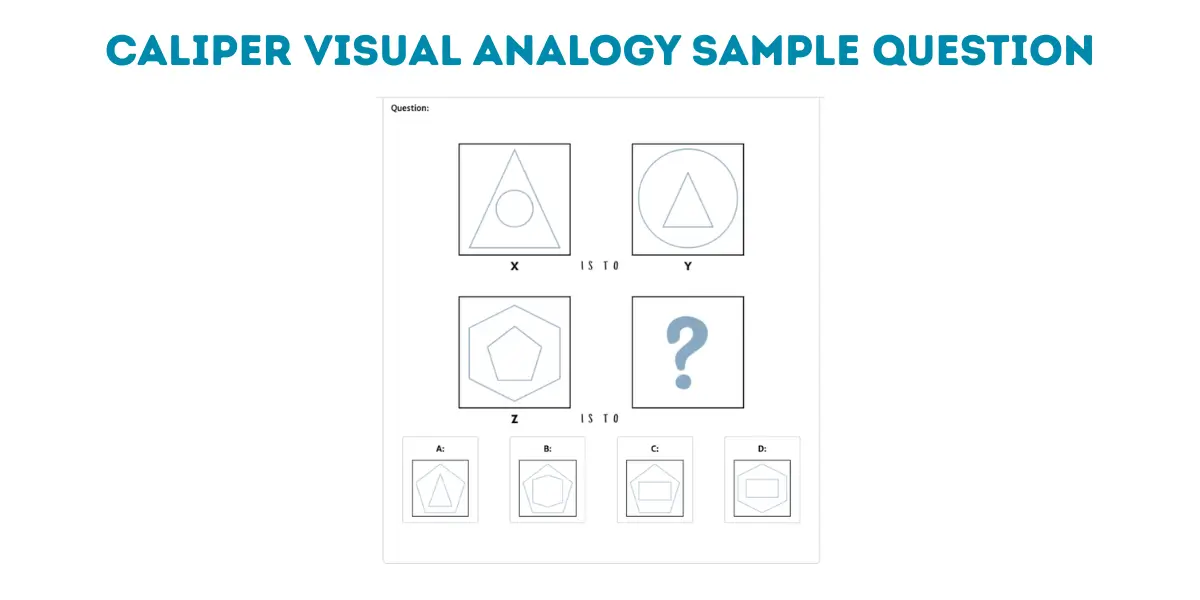
With the right approach, even the trickiest visuals become predictable.
Caliper Matrices Questions
This section presents a 3×3 grid of images with one piece missing. Each row and column follows a visual rule—such as movement, shape variation, or progressive change—and your job is to figure out the rule and select the image that completes the grid.
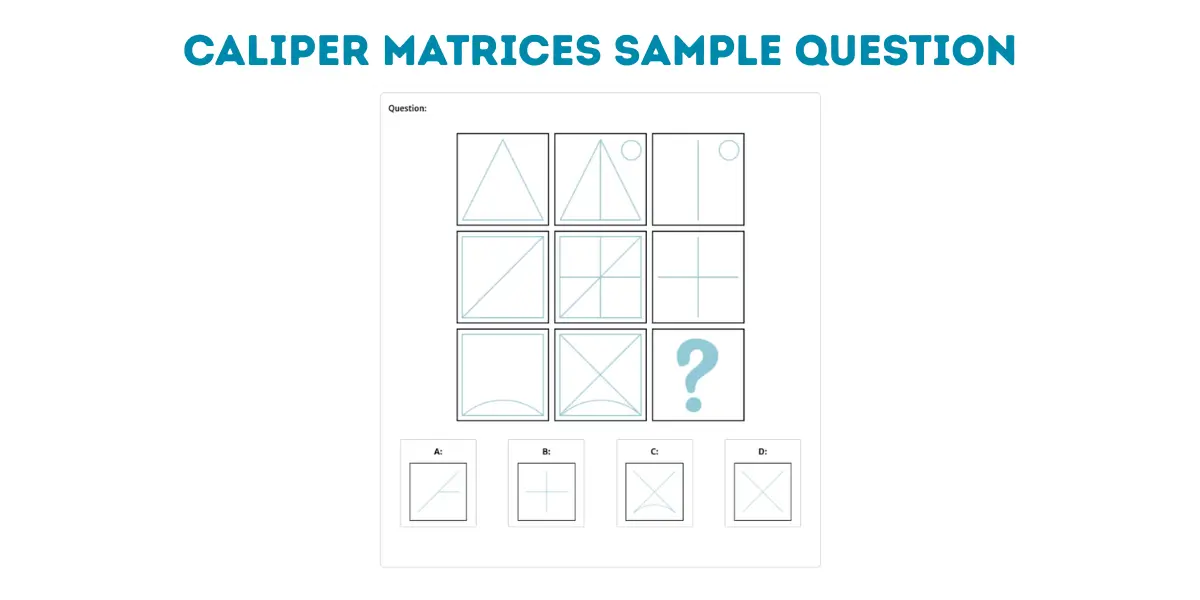
Caliper Visual Series Questions
Here, you’ll analyze a sequence of images that change step-by-step through a consistent visual rule—like rotation, shape evolution, shading, or layering. You must predict the next image in the sequence.
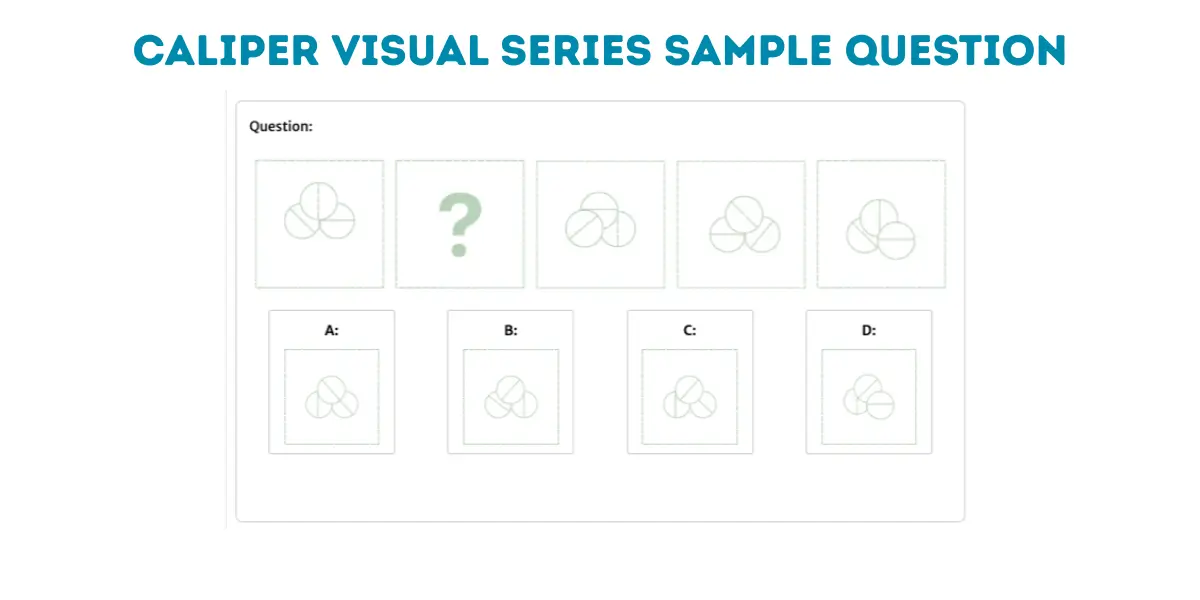
Caliper Number Series Questions
These questions involve numerical sequences governed by hidden mathematical rules, such as increasing patterns, multiplication, alternating steps, or combined logic. You need to determine the next number in the series.
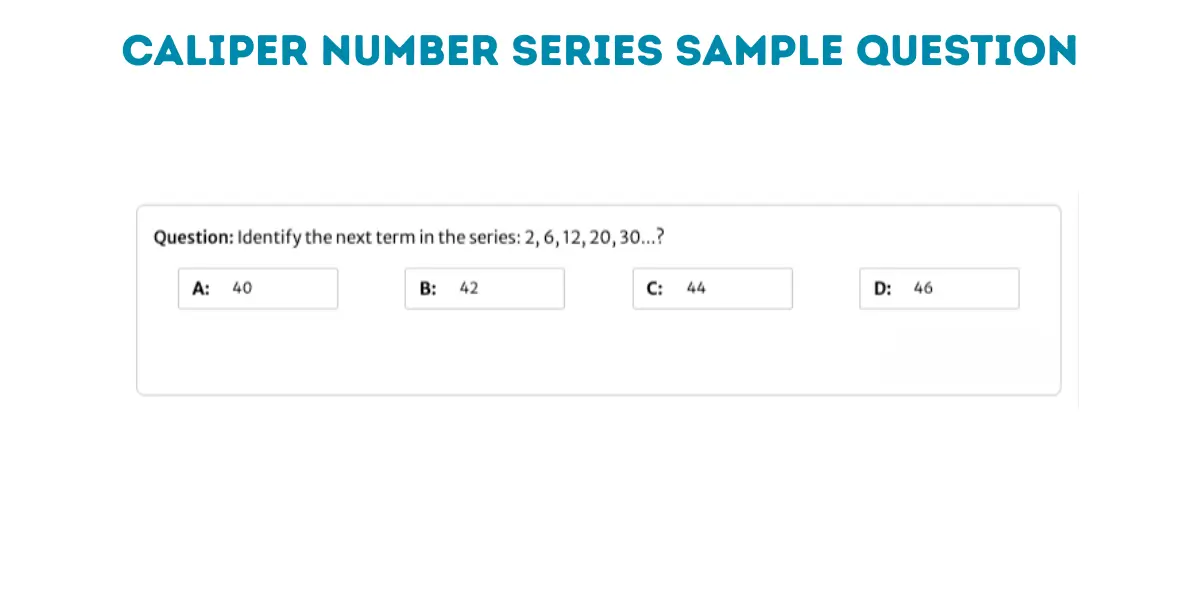
Caliper Personality Assessment Sections
The personality portion of the Caliper Assessment evaluates stable traits and behavioral tendencies that influence how a person works, communicates, solves problems, and interacts with others. It’s often used to assess leadership potential, collaboration style, and decision-making under pressure. Responses are compared against benchmarks for specific job roles.
Caliper Most/Least Questions
In this format, you’ll be given four statements reflecting different personality traits or workplace behaviors. Choose one that describes you the most and one that describes you the least. This format evaluates how you prioritize traits and distinguishes between equally positive qualities. It also checks for consistency to build a personality profile aligned with job roles. Since all options may sound appealing, choose what genuinely reflects your behavior—not what seems “best.”
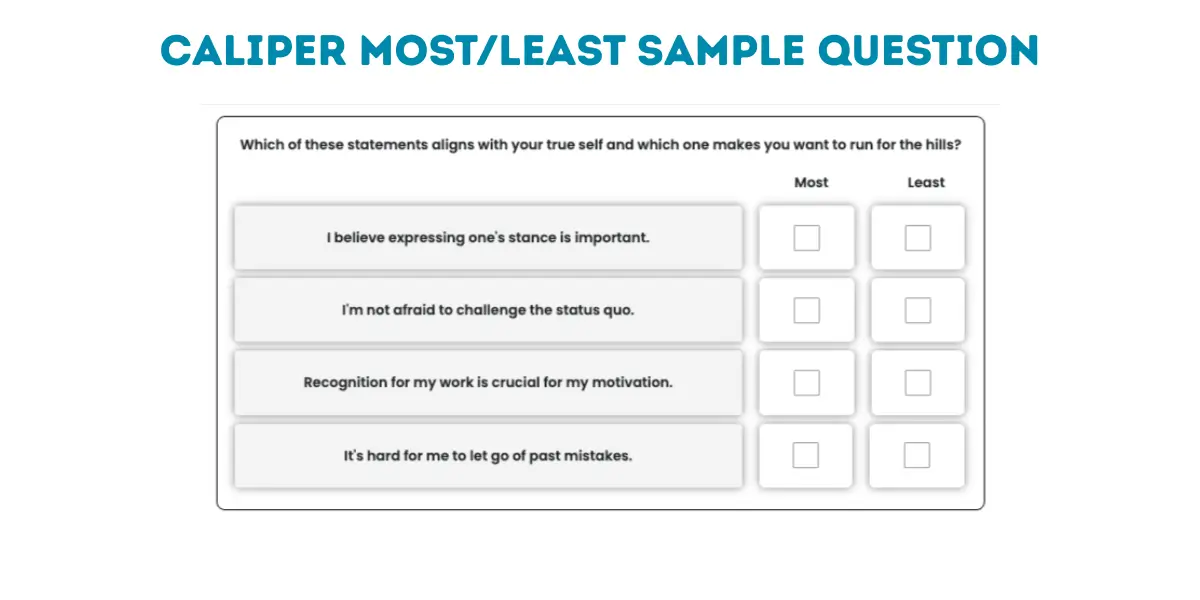
Caliper Likert Scale (Agree–Disagree / 7-Point Scale) Questions
A core part of the Caliper Personality Assessment, this format presents a statement about your behavior, attitude, or beliefs. You’ll indicate how much you agree or disagree—typically on a 7-point scale from Strongly Agree to Strongly Disagree, though some versions use True/False or Always/Never.
These questions offer a nuanced view of your personality, assessing traits like leadership, resilience, teamwork, risk-taking, and emotional control. By allowing degrees of agreement, this format creates a more detailed and accurate personality profile.
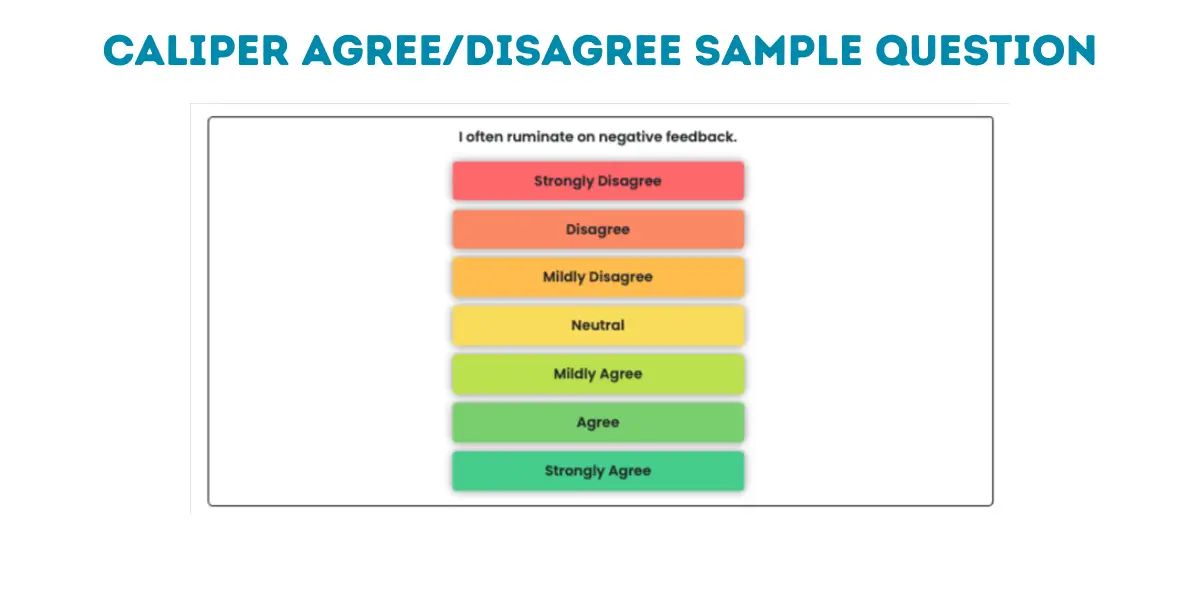
Want to try a full practice test? While the sample questions above give a glimpse into the Caliper Assessment format, there’s no substitute for hands-on experience. Take our free Caliper practice test to assess your skills under real test conditions and get a better understanding of what to expect.

Caliper QuickPass™
Last Updated: Apr 11, 2025
Course Content
 Introduction2 StepsBuy this Course: Get full access to all lessons, practice tests and guides.
Introduction2 StepsBuy this Course: Get full access to all lessons, practice tests and guides. Cognitive - Visual Analogy4 StepsBuy this Course: Get full access to all lessons, practice tests and guides.
Cognitive - Visual Analogy4 StepsBuy this Course: Get full access to all lessons, practice tests and guides. Cognitive - Matrices4 StepsBuy this Course: Get full access to all lessons, practice tests and guides.
Cognitive - Matrices4 StepsBuy this Course: Get full access to all lessons, practice tests and guides. Cognitive - Visual Series4 StepsBuy this Course: Get full access to all lessons, practice tests and guides.
Cognitive - Visual Series4 StepsBuy this Course: Get full access to all lessons, practice tests and guides. Cognitive - Number Series4 StepsBuy this Course: Get full access to all lessons, practice tests and guides.
Cognitive - Number Series4 StepsBuy this Course: Get full access to all lessons, practice tests and guides. Behavioral - Intro1 StepBuy this Course: Get full access to all lessons, practice tests and guides.
Behavioral - Intro1 StepBuy this Course: Get full access to all lessons, practice tests and guides. Behavioral - Competencies1 StepBuy this Course: Get full access to all lessons, practice tests and guides.
Behavioral - Competencies1 StepBuy this Course: Get full access to all lessons, practice tests and guides. Behavioral - Traits5 StepsBuy this Course: Get full access to all lessons, practice tests and guides.
Behavioral - Traits5 StepsBuy this Course: Get full access to all lessons, practice tests and guides. Behavioral - Caliper Job Models5 StepsBuy this Course: Get full access to all lessons, practice tests and guides.
Behavioral - Caliper Job Models5 StepsBuy this Course: Get full access to all lessons, practice tests and guides. Behavioral - Question Format and Scoring2 StepsBuy this Course: Get full access to all lessons, practice tests and guides.
Behavioral - Question Format and Scoring2 StepsBuy this Course: Get full access to all lessons, practice tests and guides. Behavioral - Practice Questions1 StepBuy this Course: Get full access to all lessons, practice tests and guides.
Behavioral - Practice Questions1 StepBuy this Course: Get full access to all lessons, practice tests and guides. Caliper Most/Least Practice Questions1 StepBuy this Course: Get full access to all lessons, practice tests and guides.
Caliper Most/Least Practice Questions1 StepBuy this Course: Get full access to all lessons, practice tests and guides.
Why the Caliper Assessment Matters More Than You Think
The Caliper Assessment is more than a personality quiz—it filters candidates by compiling your traits, cognitive style, and behaviors into a profile that is then compared against a predefined job model set by employers.
You're evaluated against an ideal candidate model you can't see—any mismatch can cost you the job.
There's no pass/fail, but if your profile doesn't match the target, you're out.
A strong interview or resume won’t save you if your profile deviates from the employer’s model.
Even high-potential candidates may be overlooked if their traits don’t align closely with the benchmark.
Natural inconsistencies in answers might be flagged as indecision or lack of clarity.
Unlike interviews, you can't explain or defend your answers—what you submit is final.
Why Caliper QuickPass™ Gives You the Edge?
| Features | Free Sample Sites | Caliper QuickPass™ |
|---|---|---|
| Covers All Question Types | ❌ Limited Formats Only | ✅ Full Cognitive + Behavioral Coverage |
| Practice with Strategy | ❌ No Strategy Guidance | ✅ Step-By-Step Approach for Each Section |
| Behavioral Trait Insight | ❌ Not Included | ✅ Mock Profile Based on Real Caliper Traits |
| Cognitive Walkthroughs | ❌ Lacking or Absent | ✅ Visual Reasoning, Number Series, Logic With Solutions |
| Human Support | ❌ None | ✅ Direct Expert Support Within 24 hours |
| Built for Job Roles | ❌ One-Size-Fits-All | ✅ Specific Prep Paths for Particular Job Roles |
| Realistic Testing Environment | ❌ Static PDFs or Basic Quizzes | ✅ Interactive Simulations That Mirror the Real Test |
| Psychological Breakdown | ❌ Surface-Level Only | ✅ Built-in Insights Into How Answers Affect Your Outcome |
Success Stories 4.5 1066 Reviews





rob, 16 Jan
Solid review course that covers the…
Solid review course that covers the relevant topics in good detail





chad, 11 Jan
Great Program, amazing practice simulations
Easy to understand. Passed tests on first time thru.





QUEEN RIGHTEOUS, 07 Jan
Highly recommended.Great instructional…
Highly recommended.Great instructional information. I passed on the first try.





neal, 19 Dec
The practice tests are similar to the…
The practice tests are similar to the real ones. The guidance provide roadmap to solve the questions. It is very helpful and a great aid to solve assessments related to personality.





MS, 17 Dec
The Caliper Test
The Caliper Test prep has everything you're looking for to be prepared. Particularly for the quantitative questions where on the actual test you will only get 12 questions, so an incremental correct answer has a large impact on your score and prep can make all the difference.Highly recommend.





MasterCommand, 14 Nov
Prepterminal. Prepare, practice, execute.
To say that Prepterminal helped me prepare and be ready for the testing phase would be an understatement. At first, looking at the course, I felt overwhelmed with the course material, but the course broke down each subject effectively which made it easier to understand. There were a few issues with some of the audio portion of the testing course, but beyond that, the course was well worth the money.
Frequently Asked Questions (FAQs): Caliper Assessments
How long does a caliper assessment take?
The test typically takes about 60-75 minutes to complete, though there is no time limit. Some candidates may take longer depending on their pace.
What does the Caliper assessment measure?
It measures 20 personality traits (e.g., assertiveness, adaptability) and one cognitive ability (abstract reasoning). These traits predict workplace behaviors and competencies relevant to specific job roles.
Can you fail a caliper assessment?
No, you cannot fail the Caliper Assessment. There are no right or wrong answers in the personality section, and while the cognitive section does have correct answers, the overall assessment is used to determine fit, not to pass or fail you. However, if your caliper profile does not align with the job requirements, you may not progress in the hiring process.
How do I get my caliper assessment test results?
Results are sent directly to the hiring manager as a competency report. Candidates do not receive their scores but will know if they move forward in the process.
Is the Caliper assessment hard?
Many candidates find it challenging due to its mix of complex cognitive questions and behavioral assessments. Despite its difficulty, many students have successfully navigated the exam through diligent practice and preparation.
What is a good score on the caliper test?
Scores range from 1 to 99, with higher scores indicating a better fit for the job. A score of 80 or above suggests an excellent match, 60-79 indicates a good match with potential challenges, and below 59 implies a poor fit. To achieve a good result, your personality traits and cognitive skills should closely match the ideal profile for the position.
How to pass a caliper assessment?
The Caliper Assessment isn’t pass/fail, but strong alignment with job-specific traits is key. To boost your performance, focus on practicing abstract reasoning, understanding the question formats, and answering honestly and consistently.
Candidates who use targeted prep materials see up to a 60–70% improvement in alignment scores.
Our Caliper QuickPass™ course is designed to help you do just that—offering realistic practice tests and proven strategies to increase confidence, accuracy, and fit for your desired role.
What happens after I complete the Caliper Assessment?
Your responses are used to create a Caliper profile that evaluates your fit for the role. Results are sent to the employer—not to you—and feedback is usually not shared unless the company chooses to do so. If you don’t hear back, it often means your profile didn’t align with the job requirements.
Why is the Caliper Assessment difficult?
The Caliper Assessment combines cognitive reasoning with personality profiling, making it uniquely demanding. Here’s what makes it tricky:
- No Time Limit, But High Mental Load: The test is untimed, but that leads to overthinking and fatigue—especially with tough abstract logic questions.
- Abstract Logic Puzzles: You’ll face number patterns, matrices, and analogies without much context, requiring sharp problem-solving skills.
- Confusing Personality Questions: Many personality statements feel equally true or subtly different, forcing tough choices.
- Inconsistencies Hurt Your Score: Contradictory responses (e.g., being both assertive and risk-averse) can signal misalignment—even if unintentional.
- Scoring Is Role-Specific: You’re not just being assessed overall—you’re being matched to an ideal candidate profile for the job. Great traits can still count against you if they don’t align with the role.
- No Right or Wrong in Behavior Section: Unlike typical tests, there’s no “correct” answer—only answers that show consistency and fit.

Created by: Michael Lerner
BSc, Psychometric Tutor, Prepterminal Test Expert
6876 students, 4.5, 1066 Reviews
Hey, welcome to our Caliper QuickPass™ Prep Course. I’m Michael, I am here to assist you with any queries you may have about the Caliper Assessment Preparation. Don’t hesitate to contact me at [email protected].
